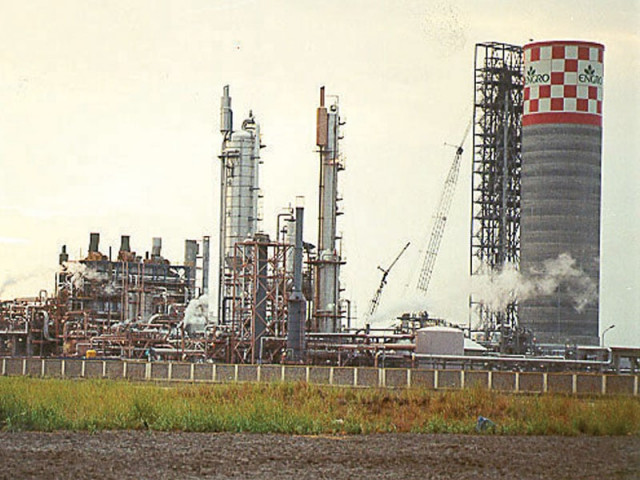Fertiliser plants: Gas supply plan proposed after loan default warning
Plan calls for providing 137 mmcfd of gas to fertiliser manufacturers.

The Ministry of Petroleum and Natural Resources has come up with a short-term plan to provide 137 million cubic feet per day (mmcfd) of gas to four fertiliser plants amid warnings of default on bank loans and closure of urea plants.
In the plan submitted to the Economic Coordination Committee (ECC) of the cabinet, the ministry has called for diverting gas supply from the overall industry, which will increase gas outages by one day a week.
The proposals come following warnings about default on Rs150 billion worth of loans taken by the fertiliser industry and loss of billions of rupees to the country’s economy due to forced closure of urea manufacturing plants.
The ministry has recommended that 60 million cubic feet per day (mmcfd) of gas, being supplied to Gas Turbine Power Stations (GTPS) on Wapda’s grid, should be diverted to Engro Fertilizers.
According to officials, the GTPS power plants have not been consuming the full allocation of 200 mmcfd from Kandhkot gas field since April this year, leading to a drop in production from the field. Gas supply from Kandhkot can be enhanced to 225 mmcfd, which would be sufficient to compensate for the diversion of 60 mmcfd, they said.
In addition to this, the ministry has recommended supply of 22 mmcfd from Mari Gas field to Engro Fertilizers, which will take the total to 82 mmcfd. Agritech Fertilizer is likely to be provided 25 mmcfd from Makori field, owned by MOL.
According to the plan, Sui Northern Gas Pipelines Limited (SNGPL) may curtail gas supply to the overall industry and arrange around 45 to 55 mmcfd for two other fertiliser plants – Pakarab Fertilizer and Dawood Hercules – to enable them to operate on rotational basis.
According to estimates of the fertiliser industry, lack of gas supply to the four fertiliser plants has caused annual production loss of around 2.7 million tons of urea. In the wake of closure of the plants, the government will have to import urea, costing an estimated Rs140 billion. On these imports, the subsidy burden will be Rs61 billion for sale of the imported commodity to the farmers at prices matching rates in the domestic market.
According to a briefing given to the ECC, the fertiliser industry is highly leveraged and closure of plants for prolonged period will lead to default on bank loans of around Rs150 billion. This situation would hurt the entire financial market of the country as the loans would eventually be converted into non-performing loans (NPLs), the ECC was told.
The ECC was asked to reconsider the policy of suspending gas supply to the fertiliser plants as the country was heavily reliant on agriculture, which required uninterrupted supply of fertiliser from the domestic industry as imports were costly.
According to estimates of a senior government official, “the closure of industry will result in loss of 15,000 direct and 50,000 indirect jobs and will trim the country’s GDP by Rs100 billion.”
Published in The Express Tribune, September 27th, 2012.



1733130350-0/Untitled-design-(76)1733130350-0-208x130.webp)















COMMENTS
Comments are moderated and generally will be posted if they are on-topic and not abusive.
For more information, please see our Comments FAQ